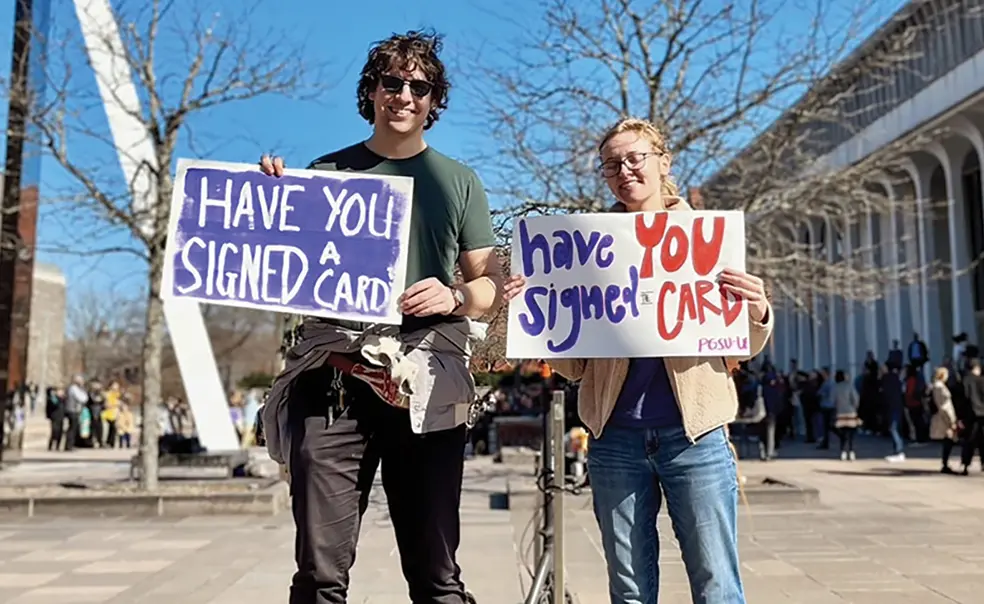Grad Student Advocates Take Lessons From Failed Union Vote
Graduate students were ‘shocked’ when a bid to unionize failed. What happened?
When the vote to unionize Princeton graduate students failed, 391-652, on May 14, the reaction from pro- and anti-union organizers was the same. It “shocked everybody,” said Sophia Yoo, an engineering Ph.D. candidate.
Princeton’s postdocs had voted to unionize just days earlier. So why didn’t the graduate students?
According to Yoo, questions about the need for a union began during Princeton Graduate Students United’s (PGSU) recruiting cycle in 2022. In 2023, as the union card drive started, some students began to harbor private concerns about PGSU’s affiliation with the United Electrical, Radio, and Machine Workers of America (UE). But these concerns didn’t reach a larger audience until days before the election.
One sticking point was that UE requires people in the bargaining unit to pay dues of 1.44% of their stipend annually (around $700) regardless of whether they choose to join the union.
Critiques of UE continued in the week before the May 2024 election. Graduate student Himawan Winarto ’18 said that he would have considered voting differently if the national affiliate was a different union, such as the United Auto Workers (UAW), which Princeton’s postdocs joined this spring.
Three graduate students told PAW that they felt the pay and benefits the University provides are already sufficient, and they didn’t see a need for unionization.
Other criticisms focused on national UE’s political opinions on foreign policy, which include support of the Boycott, Divest, and Sanction (BDS) movement against Israel and a 2015 endorsement of the Maduro government in Venezuela.
According to Paul Clark, a professor of labor and employment relations at Penn State University, UE’s positions are tied to its history as the U.S. union furthest to the left. “And you’ll see them taking positions on things like Israel-Palestine, and other things that other unions wouldn’t take a position on,” he said.
Tal Rubin, an Israeli graduate student in plasma physics, took issue with UE’s policy on BDS as well as the dues-paying model. Rubin said he has nothing in common with “people like [PGSU organizer] Aditi Rao” who are “hardcore communist, anti-American, anti-Israeli people who are very involved in the [encampment] in central campus … .”
Rao, a Ph.D. candidate in classics, agreed with Rubin’s characterization. “I am anti-American imperialism, I am a communist, I am for unionization, and I am against the State of Israel. All of those things are very true,” she said.
Rao explained that in her view, Palestinian liberation “rests entirely upon labor contingencies to bring themselves together,” and that the two issues are connected.
Some “vote no” sentiment was unrelated to UE. Three graduate students told PAW that they felt the pay and benefits the University provides are already sufficient, and they didn’t see a need for unionization.
Part of the push to hold the unionization vote last May stemmed from concerns about the 2024 presidential election. The partisan National Labor Relations Board (NLRB) gets the ultimate say on whether a unionization vote can be held, and Democratic administrations are usually more union friendly.
“We felt like the window of opportunity was closing,” said Dante Furioso, a PGSU organizer and architecture student. “And yes, it’s true that UE is not a perfect organization. But the chance of at least forming a union versus not forming one at all, I think, drove that decision [to hold the vote in May].”
The voting body was set in April via an agreement between PGSU and the University, overseen by the NLRB. Students on fellowships were not allowed to vote. The voting body ultimately consisted of 49% of all graduate students; 82% of eligible voters were students in science, technology, engineering, and mathematics (STEM).
Princeton seems to have “an exceptionally high ratio” of graduate students in STEM, according to Clark, and those students “are the hardest ones to organize.”
Rao said accepting the voting bloc proposal and pushing for a May vote may have undermined PGSU and “hindered a lot of our progress at the polls.”
Several students also told PAW that some were unnerved by PGSU’s campaign tactics, which included calls, emails, and home visits. Although these are common strategies in the United States, some — particularly international students — felt that PGSU had violated their privacy.
The Graduate Student Government (GSG) uses Slack, a messaging system accessible to all graduate students that functions like a social media platform. PAW reviewed messages from the spring semester and found they overwhelmingly centered on the election as it approached, and some devolved into harsh language and personal attacks.
Jing Wu, a PGSU organizer and international student from China studying economics, said a separate forum for Chinese students, hosted on the messaging platform WeChat, became so hostile toward PGSU that he and a fellow organizer chose to step away from it.
Perhaps the most contentious escalation came days before the election in an email.
Christopher Catalano, a graduate student in molecular biology and vice president of GSG, sent an email advocating for unionization to the graduate student email list. According to GSG rules, only messages approved by the GSG executive committee can be sent to that list.
Catalano told PAW he felt a “responsibility” to provide his opinion as an elected official but said he should have sent the email to another list.
Slack discussions rapidly turned to Catalano’s email. Some students called for him to resign. “It’s changed my experience at Princeton and I regret it profoundly, because it’s been awful,” he said, citing the loss of friends following his email.
Because of the NLRB’s one-year waiting period and uncertainty about the next presidential administration, Rao said it could be several years before another vote.
The unionization movement, Rao said, “really needs the lifeblood” of new graduate students.
For now, the experience seems to have left a bitter taste in the mouths of many graduate students.










No responses yet